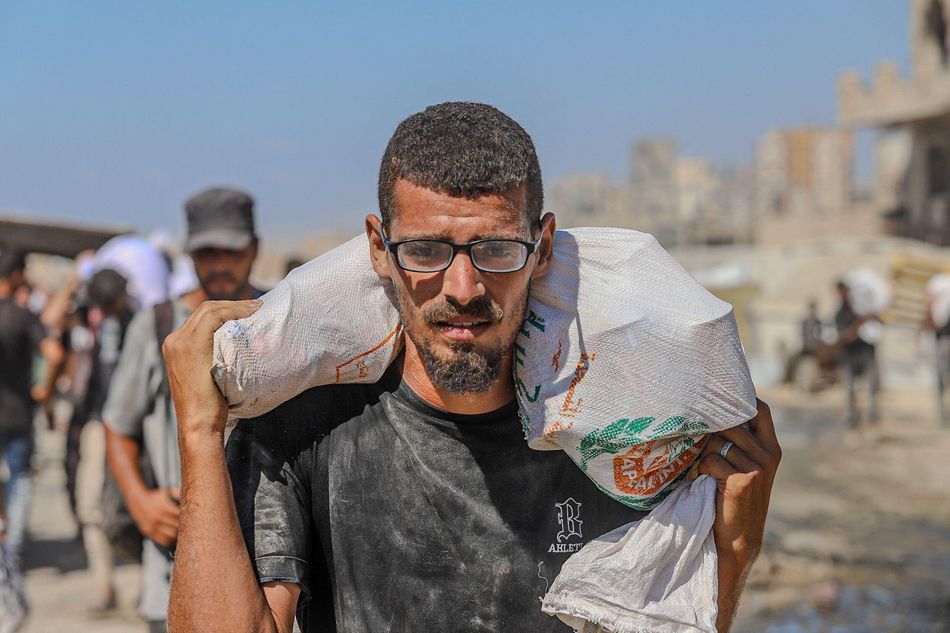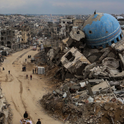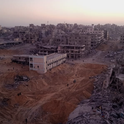How does a mother tell her child that there will be no bread today—or tomorrow? What words can soften the ache when a little one asks, “When will we eat like other children do?”
In Gaza, war isn’t counted only in airstrikes or rubble. It’s measured in children’s hollow faces, in the weight they never gain, in nights where hunger is the only thing that grows. Milk has become a memory; food a distant dream.
Malnutrition here isn’t a line in a report. It’s a child with brittle hair and sunken eyes, a belly swollen not from fullness but from starvation. It is mothers keeping their own fasts day after day so their children can have a sip of water or half a crust of bread.
By July 2025, nearly one in five children under five in Gaza City were acutely malnourished, at least three times higher than the previous month. By mid‑July, treatment centres reported that more than 6,500 children had been admitted for acute malnutrition in June, followed by nearly 5,000 more in just the first two weeks of July, the highest admissions recorded since the war began. Fewer than 15 per cent of nutrition centres are reportedly functioning, leaving many children untreated.
Gaza’s parents have lost more than homes, friends and family. They have lost the ability to fulfil the most basic parental duty: to protect their children; to feed their children until they smile, full and safe.
In Gaza City, 32-year-old Um Hassan is one such parent. She lives in an encampment in the courtyard of Gaza's old courthouse. The air is heavy inside, the nylon tents sag under the weight of dust and heat. They are crammed so close they seem to suffocate one another. A thin path of wastewater snakes between them, drawing flies that settle on anything that is still.
On a frayed mat, Um Hassan holds her two‑year‑old son, Yazid. At just eight kilograms, his legs buckle when he tries to stand. His face is pale. “He should be running,” she whispers. “Instead, I carry him everywhere.” She strokes his hair, lifting a frail arm. “He barely eats. I mash up whatever food I can find—lentils, crumbs—just to get a few bites in. He clings to me all day. Doesn’t play. Doesn’t move like other kids.”
Her family has been displaced more than 40 times since the war began. Their home in Beit Lahia in northern Gaza was destroyed. Her husband, once a factory worker, is now injured and confined to their tent. “Before the war, we lived modestly,” she says. “With his salary and the UN ration, we managed. He’d bring chicken sometimes, vegetables, fruit. The last time we ate chicken was before the war. The last time we had bread was two months ago.”
Now they live mostly on lentils. “We fast for days just to leave something for the children. Sometimes, there’s nothing—only water. At night they cry, saying, ‘Mama, we’re hungry.’ I hold them and say, ‘You’ll eat in heaven.’ Then I cry when they fall asleep.”
Even outside, hunger follows. “I can’t let them play with other kids,” she says. “If they see someone holding bread, they come back begging me for a bite. And I have nothing.”
Her youngest, Mohammad, is one--and-a-half years old but slightly bigger than Yazid. “He can walk, but not far. When I take him to search for food or line up at the charity kitchens, he gets tired quickly. He has constant stomach issues, skin fungus. The doctor says it’s malnutrition. But what can I do?”
Each morning, Um Hassan leaves the tent early and walks in the blistering heat, searching for food. “Sometimes we wait in line for hours and return with nothing. Other days, there’s no kitchen at all. When I find a kilo of flour, I bake it and divide each pita loaf into four. If a neighbour gives me a kilo, I split it between the kids—two bites each. Just enough to hush the hunger.”
She points to the entrance to the tent. Flies circle empty plates. “We used to have oil, salt, tea. Now it’s just lentils, and only when we find them. Bread is a blessing. Even a biscuit is a dream.”
Often she burns nylon from food packaging to cook flatbread or boil lentils. “There’s no proper wood,” she explains. “I know it’s toxic, but I can’t watch them starve.”
Um Hassan’s husband sits silently inside the tent. He looks broken. “He used to lift them on his shoulders, walk them to school. On Fridays, he’d bring fish or chicken. Now, he returns with nothing. I see his heart break.”
Her voice lowers. “All I pray for is one full meal. That one day they sleep without hunger. One day where they can play like children, not lie still and weak.” She hugs Yazid tighter. “Just once, I want to give them bread without tearing it into quarters.”
Um Hassan may often feel alone, like the world has abandoned her children, but she is one of tens of thousands of parents in Gaza struggling to save their sons and daughters. And their numbers grow every day, as their children shrink.
This article has been updated to clarify that Um Hassan burns nylon from food packaging to cook in lieu of firewood












